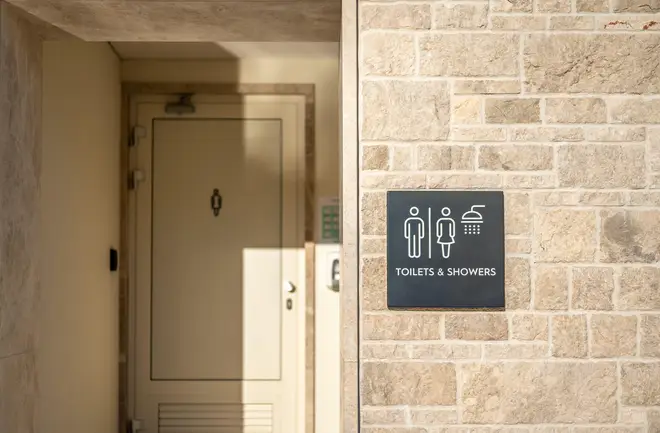
Clive Bull 1am - 4am
4 April 2022, 22:19

Transgender women can be legally banned from single-sex toilets and changing rooms, the equalities watchdog has declared.
The equalities watchdog found it is legal for organisations such as refuges and gyms to legally exclude transgender people from single-sex services in certain scenarios, such as to prevent trauma and enable privacy.
Organisations must balance the impact on all service users and demonstrate "a sufficiently good reason", the Equality and Human Rights Commission (EHRC) said.
Doing so could be unlawful if the organisation cannot show such action is a proportionate means of achieving a legitimate aim, the watchdog added.
This could be to enable privacy or decency, to prevent trauma or to ensure health and safety.
Read more: 'You allow me to die': West failing to stand up to 'new Hitler', says ex-Ukrainian PM
Read more: Tory MPs will 'sign away our democracy' if Boris isn't sacked, says ex-Thatcher advisor

Girls' schools not accepting transgender students is 'lawful'
The fresh guidance, published on Monday, is intended to be a practical guide to help organisations such as hospitals, retailers, hospitality and sports clubs implement policies that are legal and balance the needs of different groups.
It is the first time guidance on this issue has been issued, and follows pleas for clarity from the Commons Women and Equalities Committee and service providers.
The new guidance contains hypothetical examples of organisations practically interpreting the Equality Act and will have huge ramifications for hospitals, retailers, hospitality and sports clubs which have faced difficult issues in recent years under pressure from the trans lobby.
It makes it clear that it is legal for a gym to limit communal changing rooms to a single sex, as long as a gender neutral changing room is also provided for trans people.
It also says a domestic abuse refuge can exclude trans women from emergency accommodation if feedback from female survivors "indicates that they would feel uncomfortable sharing accommodation with trans women for reasons of trauma and safety".
The refuge could compile a list of alternative sources of support for trans women in the local area, it said.

Olympic advisor says trans women can compete fairly in most sports
Organisers of a group counselling session for female victims of sexual assault could exclude trans women if they judge that those attending "are likely to be traumatised by the presence of a person who is biologically male", it says.
A leisure centre could choose to exclude trans women from female-only fitness classes "because of the degree of physical contact involved", while a gym could introduce self-contained gender-neutral changing facilities if there are concerns about the safety of trans men in communal changing rooms.
The EHRC says some providers may wish to develop a policy on how services are provided to trans people, but this is not legally necessary.
It is good practice to record reasons and evidence for taking a decision to provide a separate or single-sex service, it adds.
Baroness Kishwer Falkner, EHRC chairwoman, said: "Our mission at the EHRC is to protect the rights of everyone and ensure that people across Britain are treated fairly.
"There is no place for discrimination against anyone based on their sex or gender reassignment.
"Where rights between groups compete, our duty as an independent regulator is to help providers of services and others to balance the needs of different users in line with the law.
"Organisations are legally allowed to restrict services to a single sex in some circumstances. But they need help to navigate this sensitive area. That is why we have published this guidance - to clarify the law and uphold everyone's rights."
A Stonewall spokesman said the guidance appears to contravene the core presumption of the Equality Act - inclusion - and shifts the focus on to reasons for excluding trans people.
He said: "The examples appear to encourage blanket bans, rather than by a case-by-case decision making, and cover restricting access to day to day settings like bathrooms and gym classes, which is extraordinary.
"This leaves more, not less confusion, and more, not less, risk of illegal discrimination."
It comes as a new women's rights campaign, called Respect My Sex If You Want My X, builds up momentum ahead of the local elections.
Maya Forstater, executive director of the campaign group Sex Matters, called the guidance a "big step forward".
She said: "It recognises that everyone's rights need to be balanced, and often the way to do this is with a policy based on biological sex, expressed clearly and simply.
"The new guidance provides examples of how trans people can be included without undermining other people's dignity and privacy (for example with 'gender-neutral' options), and says that everyone should be treated with respect."